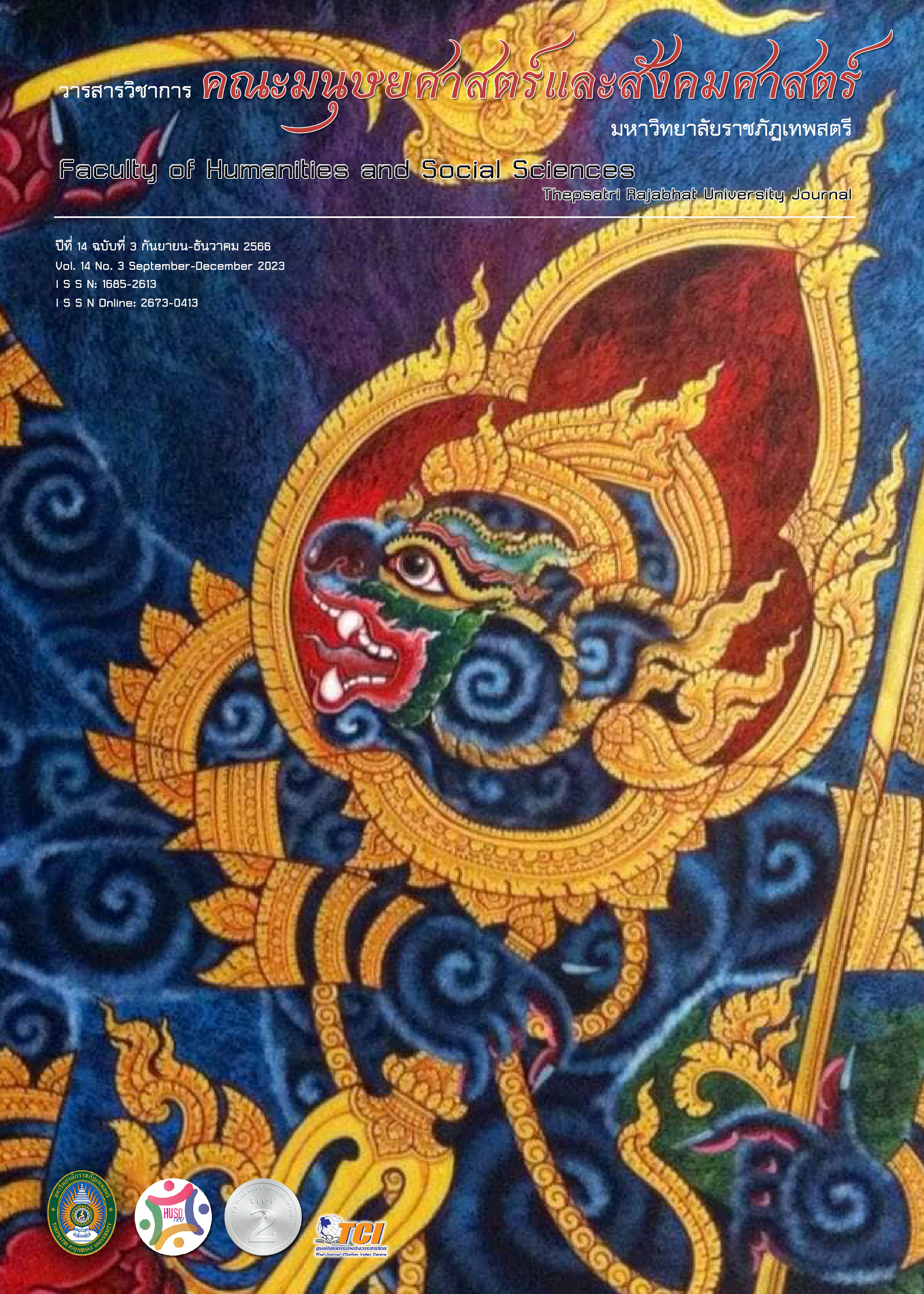การใช้แอปพลิเคชันเกมดนตรี เพื่อพัฒนาการจดจำตำแหน่งตัวโน้ตดนตรี บนบรรทัด 5 เส้น ของนักศึกษาชั้นปีที่ 1 สาขาวิชาดนตรีศึกษา
Main Article Content
บทคัดย่อ
การวิจัยครั้งนี้มีวัตถุประสงค์เพื่อ 1. เปรียบเทียบความสามารถในการจดจำตำแหน่งตัวโน้ตดนตรีบนบรรทัด 5 เส้น ของนักศึกษาชั้นปีที่ 1 สาขาวิชาดนตรีศึกษา ที่จัดการเรียนรู้โดยใช้สื่อแอปพลิเคชันเกมดนตรี กับเกณฑ์ร้อยละ 80 และ 2. ศึกษาความพึงพอใจของผู้เรียนที่มีต่อการใช้แอปพลิเคชันเกมดนตรีในการพัฒนาการจดจำตำแหน่งตัวโน้ตดนตรีบนบรรทัด 5 เส้น กลุ่มเป้าหมายที่ใช้ในการวิจัย จำนวน 30 คน ได้มาจากการเลือกแบบเจาะจง เครื่องมือที่ใช้ในการวิจัยได้แก่ แผนการจัดการเรียนรู้ จำนวน 6 แผน แบบทดสอบการจดจำตำแหน่งโน้ตดนตรีบนบรรทัด 5 เส้น จำนวน 30 ข้อ และแบบสอบถามความพึงพอใจที่มีต่อการเรียนโดยใช้สื่อแอปพลิเคชันเกมดนตรี จำนวน 10 ข้อ สถิติที่ใช้ในการวิเคราะห์ข้อมูล ได้แก่ ค่าเฉลี่ย ค่าส่วนเบี่ยงเบนมาตรฐาน และค่าสถิติทดสอบที ผลการวิจัยพบว่า 1. ความสามารถในการจดจำตำแหน่งตัวโน้ตดนตรีบนบรรทัด 5 เส้น หลังจากการเรียนด้วยแผนการจัดการเรียนรู้ที่ใช้สื่อแอปพลิเคชันเกมดนตรีประกอบการสอนของนักศึกษาชั้นปีที่ 1 สาขาวิชาดนตรีศึกษา สูงกว่าเกณฑ์ร้อยละ 80 อย่างมีนัยสำคัญทางสถิติที่ระดับ 0.05 และ 2. ผู้เรียนมีความพึงพอใจต่อการใช้สื่อแอปพลิเคชันเกมดนตรีประกอบการสอนอยู่ในระดับมาก
Downloads
Article Details

อนุญาตภายใต้เงื่อนไข Creative Commons Attribution-NonCommercial-NoDerivatives 4.0 International License.
เนื้อหาและข้อมูลในบทความที่ตีพิมพ์ในวารสารวิชาการคณะมนุษยศาสตร์และสังคมศาสตร์ มหาวิทยาลัยราชภัฏเทพสตรี ถือเป็นข้อคิดเห็นและความรับผิดชอบของผู้เขียนบทความโดยตรง ซึ่งกองบรรณาธิการวารสารไม่จำเป็นต้องเห็นด้วย หรือร่วมรับผิดชอบใดๆ
บทความ ข้อมูล เนื้อหา รูปภาพ ที่ได้รับการตีพิมพ์ในวารสารวิชาการคณะมนุษยศาสตร์และสังคมศาสตร์ มหาวิทยาลัยราชภัฏเทพสตรี ถือเป็นลิขสิทธิ์ของวารสารวิชาการคณะมนุษยศาสตร์และสังคมศาสตร์ มหาวิทยาลัยราชภัฏเทพสตรี หากบุคคลหรือหน่วยงานใดต้องการนำทั้งหมดหรือส่วนหนึ่งส่วนใดไปเผยแพร่ต่าหรือกระทำการใดๆ จะต้องได้รับอนาญาตจากวารสารวิชาการ ฯ ก่อนเท่านั้น
เอกสารอ้างอิง
ณรุทธ์ สุทธจิตต์. (2561). ดนตรีศึกษา หลักการและสาระสำคัญ. กรุงเทพฯ: สำนักพิมพ์แห่งจุฬาลงกรณ์มหาวิทยาลัย.
ภัทรพล ตันตระกูล. (2561). ผลการเรียนด้วยบทเรียนเอ็มเลิร์นนิง (M-learning) บนอุปกรณ์พกพา เรื่อง สถิติสำหรับวิทยาศาสตร์สุขภาพสำหรับนักศึกษาคณะพยาบาลศาสตร์ ชั้นปีที่ 1 มหาวิทยาลัยมหิดล. วิทยานิพนธ์ปริญญามหาบัณฑิต มหาวิทยาลัยศิลปากร.
สุคนธ์ สินธพานนท์. (2553). นวัตกรรมการเรียนการสอนเพื่อพัฒนาคุณภาพของเยาวชน (พิมพ์ครั้งที่ 4). กรุงเทพฯ: เทคนิคพริ้นติ้ง.
สำนักงานสถิติแห่งชาติ. (2563). จำนวนประชากรอายุ 6 ปีขึ้นไป จำแนกตามการใช้งานคอมพิวเตอร์/อินเทอร์เน็ต/โทรศัพท์มือถือ ระดับการศึกษา และเขตการปกครอง พ.ศ. 2561. สืบค้น กรกฎาคม 21, 2565, จาก http://www.nso.go.th.
อรรถพร ธนูเพ็ชร์. (2558, พฤษภาคม - สิงหาคม). การพัฒนาบทเรียนคอมพิวเตอร์ช่วยสอนวิชาเทคโนโลยีสารสนเทศเพื่อชีวิต เรื่อง การใช้งานโปรแกรม Microsoft Excel 2010. วารสารวิจัยและพัฒนา วไลยอลงกรณ์ในพระบรมราชูปถัมภ์ สาขาวิทยาศาสตร์และเทคโนโลยี, 10(2), 55 - 65.
Alison, D., & Martin, F. (2013). ISM-The National Curriculum for Music: A Framework for Curriculum, Pedagogy and Assessment in Key Stage 3 Music. London: Incorporated Society of Musicians.
Cole, K. (2011, September). Brain-Based Research Music Advocacy. Music Educators Journal, 98(1), 26 - 35.
Demir, K., & Akipinar, E. (2018, April). The Effect of Mobile Learning Applications on Students’ Academic Achievement and Attitudes Toward Mobile Learning. Malaysian Online Journal of Educational Technology, 6(2), 48 - 59.
Elliott, D. (2012, September). Music Education for Artistic Citizenship. Music Educators Journal, 99(1), 21 - 28.
Intarasomjai, N., & U-nakarin, T. (2022, January - April). Using English Vocabulary Games to Develop Vocabulary Spelling and Retention Ability of Matthayomsuksa Three Students. Journal of Buddhist Education and Research, 8(1), 232 – 241.
Jyrgenden, H. (2014, July). Mapping Music Education Research in Scadinavia. Psychology of Music, 32(3), 291 - 309.
Kabooha, R. H. (2016, March). Using Movies in EFL Classrooms: A Study Conducted at The English Language Institute (ELI), King Abdul-Aziz University. English Language Teaching, 9(3), 248 - 257.
Thammachard, P. (2018). Thailand 4.0 Music Student: Study on Classical Guitar Repertoire Learning Process. The Asian Conference on Education 2018 Official Conference Proceedings, October 13, 2018 (pp. 573 - 580). Tokyo: IAFOR.
Yamaha Corporation of America. (1994). Facts About Technology Users. New Ways in Music Education. MI: Grand Rapids.


